For those of us who have betta fish as pets, we may often wonder if they can see in the dark. After all, it’s impossible for us to tell what our little friends are up to when the lights go out!
Fortunately, science has been able to shed some light on this question and provide us with an answer. In this article, we’ll explore whether or not betta fish can actually see in the dark – and how their vision compares to humans’.
With this knowledge, you’ll be better equipped to care for your beloved pet and make sure he or she is happy and healthy.
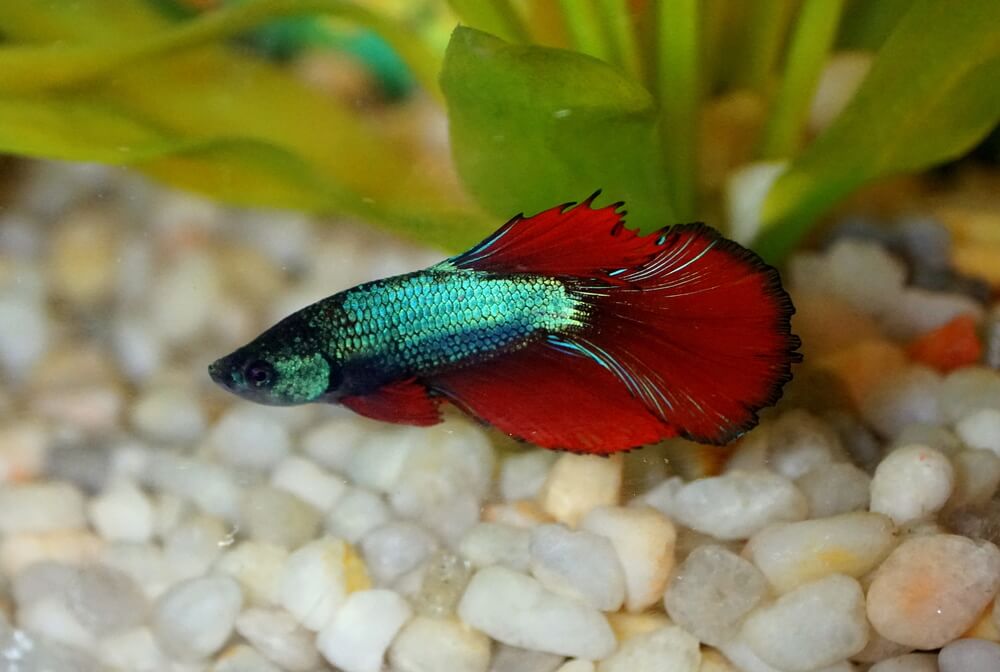
Betta Fish Anatomy And Vision
Betta fish are among the most popular aquatic pets. But what makes them so special? It starts with their anatomy and vision.
These colorful creatures boast an impressive set of eyes that can detect movement from up to three body lengths away. The paired organs have evolved over time, allowing betta fish to be especially sensitive in darker waters.
Their pupils can dilate or constrict depending on how much light is present, helping them adjust accordingly and giving them a distinct advantage when it comes to survival in deep or murky environments.
In addition to having exceptional eyesight, bettas also possess two sets of barbels – whisker-like appendages near their mouth – which allow for better navigation underwater. These tiny facial features help them find food more easily and give them additional protection against predators in dimly lit spaces.
This unique combination of eye shape and sensory perception has made these little swimmers well-equipped for life in low visibility areas!
Overall, betta fish are remarkable animals that have adapted perfectly to their surroundings thanks to evolutionary improvements made across generations – making them a great choice for aquariums everywhere!

Human Vision Vs. Betta Vision
Humans and betta fish share similar vision abilities, but there are key differences.
On average, humans can detect colors at a distance of up to 10 miles away while the average betta fish has an impressive 20/40 vision acuity, which is much better than human’s 20/200.
This means that they have superior eyesight when compared to us; however, this does not translate into night vision capability.
Unlike humans who have cone cells in their retinas, necessary for trichromatic color perception as well as seeing in dim light conditions or darkness, bettas do not possess them so cannot see clearly in the dark.
They rely on rod cells instead that help with detecting motion and sensing changes in ambient light levels but these rods aren’t enough for them to distinguish shapes and details like we can under low lighting conditions.
Betta fish also lack tapetum lucidum behind the retina – a structure found in many animals that reflects incoming light back through the retina allowing it to be detected by photoreceptors twice thus improving night vision even more – making it impossible for them to see anything other than blurry outlines in total darkness.
Giving your pet aquarium some sort of illumination will help bring out its vibrant colors since without any source of light most of what you’ll observe will appear grayish-black due to their limited visibility capabilities.
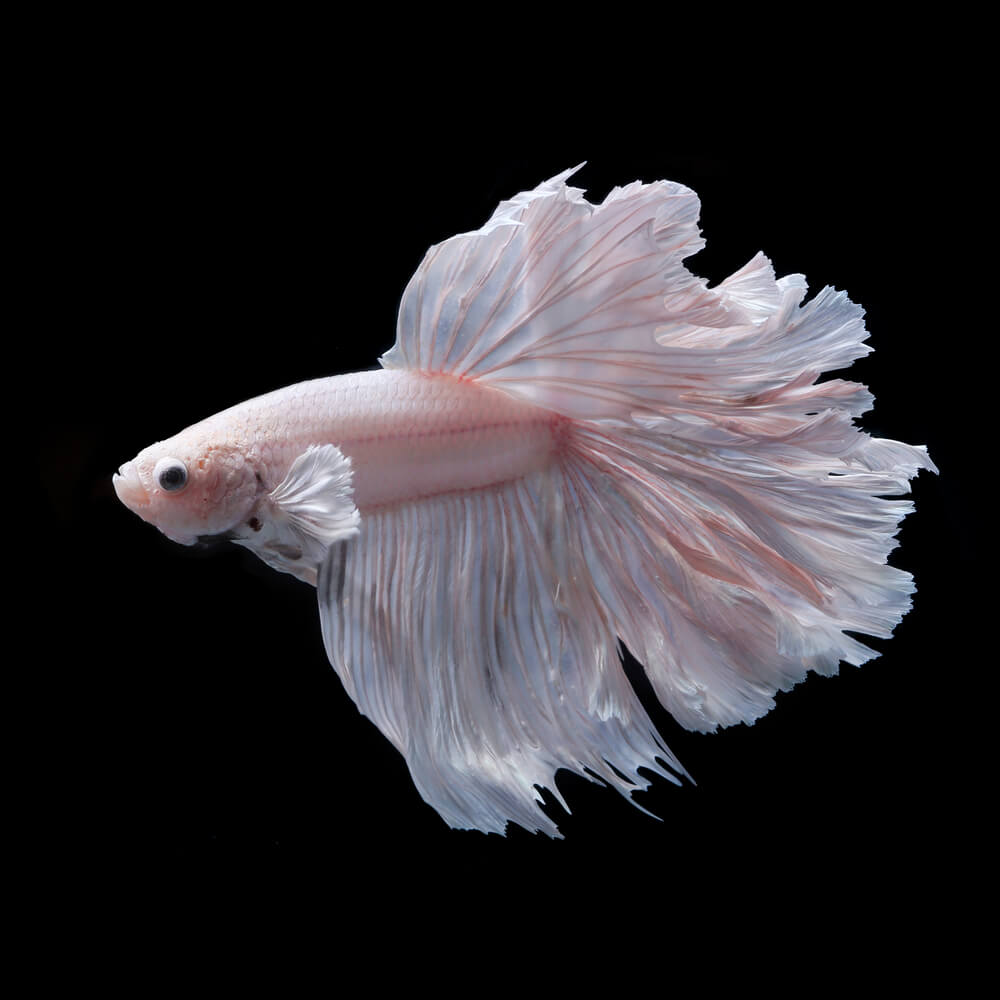
How Do Betta Fish Navigate In The Dark?
Betta fish have a unique advantage when it comes to navigating in the dark. Unlike other species of fish, they are able to see ultraviolet light and can detect potential prey or threats with greater accuracy than a human eye.
This means that betta fish can make their way around murky waters even if visibility is low. The eyes of betta fish are especially sensitive to changes in light levels, allowing them to react quickly when transitioning from one environment to another.
Even in absolute darkness, these fish possess an incredible level of vision thanks to their large pupils which allow more light into their eyes. Additionally, the biological structure of their eyes allows for better focusing capabilities compared to other types of aquatic life.
In fact, research has shown that some betta fish have evolved special adaptations specifically designed for movement in the dark such as increased pupil size and heightened sensitivity to vibrations generated by passing objects like food or predators. These features enable betta fish to thrive no matter what kind of lighting conditions they face.
The Role Of The Pineal Gland
It was a dark and stormy night, but even in the darkness of his aquarium, Betta could see clearly. This is due to an organ located deep within his tiny body – his pineal gland.
The pineal gland plays several roles in betta fish’s vision:
- It produces melatonin which helps regulate circadian rhythm – essentially allowing bettas to distinguish between day and night.
- It controls light sensitivity so that they can adjust their eyesight according to different levels of illumination.
- It also regulates hormones like dopamine and serotonin, which are important for maintaining good eye health and clarity of vision over time.
- Finally, it provides essential vitamins such as Vitamin A which assists with improved vision during low-light situations or complete darkness.
Thanks to this special organ, betta fish have superior nocturnal vision compared to other species of freshwater fish – allowing them to navigate through murky waters at night without difficulty!

Light Sensitivity In Betta Fish
Optically, betta fish have the ability to see in dim light, but they don’t have the best vision in the dark. They’re able to detect light and dark, but their perception of color is limited.
When it comes to light sensitivity, betta fish have an internal clock that regulates their circadian rhythms, which helps them adjust to different light levels. This helps them to be active during the day and sleep at night.
It’s also important to note that betta fish need a day and night cycle to remain healthy. If kept in a tank with no light cycle, they can become stressed and sick.
Lastly, betta fish can become used to living in darker environments, but it’s important to give them some exposure to light so they can maintain their circadian rhythm.
Optical Structure
Have you ever wondered how betta fish see in the dark? It’s an interesting question, and one that has spawned much debate.
As it turns out, betta fish do have some degree of light sensitivity – but their optical structure also plays a role in determining how well they can see in low-light environments.
The eyes of betta fish are equipped with two types of cells on the retina: rods and cones. The rod cells are used for detecting movement and shades of gray, while cones detect colors.
In dim lighting conditions, only the rods will be active; meaning that betta fish may not be able to distinguish between colors when it is dark. However, because these fish use both rods and cones to sense light, they can still make out shapes even after nightfall.
Betta fish rely on their eye sight more than most other species due to their unique behavior patterns and habitat preferences. They’re adept hunters by day, so being able to navigate at night gives them an edge over potential prey items – as well as any predators lurking nearby!
Light Perception
It’s clear that betta fish possess some degree of light sensitivity, which helps them to see in the dark and gives them an advantage when it comes to hunting. But how does this actually work? To understand this better, we need to look at their optical structure – specifically, the type of cells located on their retina.
Rods are used for detecting movement and shades of gray while cones can detect colors. During dim lighting conditions, only rods will be active and so they may not be able to distinguish between colors. However, since these fish use both types of cells, they still have a good sense of shapes even after nightfall.
This allows them to navigate their environment effectively despite any potential predators lurking about! Overall, betta fish rely heavily on eye sight due to their behavior patterns and habitat preferences. With their unique ability to detect light in low-light environments, they’re capable hunters by day as well as night – giving them the edge over other species when it comes to locating food sources or avoiding danger.
Circadian Rhythms
Betta fish also have a unique ability to adjust their behavior patterns based on light exposure.
This is due to the presence of circadian rhythms, which are biological processes that occur in response to changes in daylight.
These rhythms help the fish regulate activities such as feeding and mating according to their environment’s lighting conditions.
For instance, when it’s dark they’ll remain hidden until dawn so they can hunt without any danger from predators.
Similarly, betta fish will often rest during the day – when there’s too much light for them – before becoming active again at night!
With this incredible adaptation, these creatures can stay safe while still managing to fulfill all their needs no matter what time of day or year it may be.
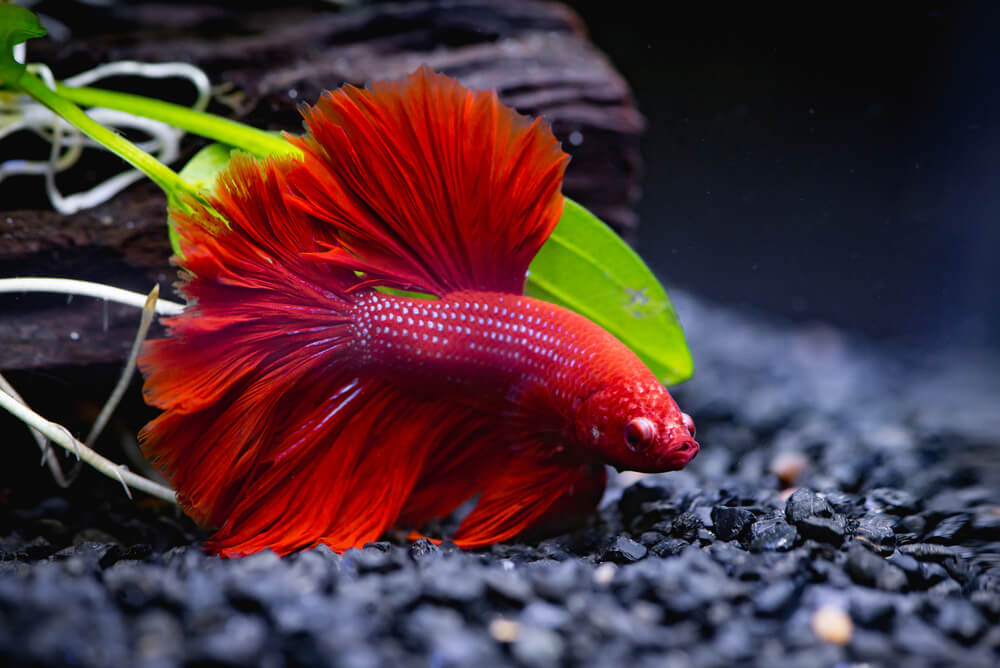
Color Vision In Betta Fish
Betta fish have evolved to be able to detect and respond to light, even in the dark. They are capable of perceiving more than one color, making them adept at distinguishing between different shapes and objects. Their vision is especially well-developed for detecting movement, allowing them to quickly react when predators approach or prey passes by.
The ability of betta fish to see in the dark has been further enhanced through their genes adapting over time. This adaptation makes them particularly sensitive to dim illumination that other species may not notice. As a result, they can recognize subtle changes in brightness as well as discriminate among various shades of darkness.
This keen sense of sight enhances their survival chances both above and below water. Betta fish rely on being able to identify potential food sources and avoid danger effectively; this heightened sense of vision enables them do just that.
Thus, it’s no surprise that betta fish have become so skilled at thriving despite living in relatively low-light environments.
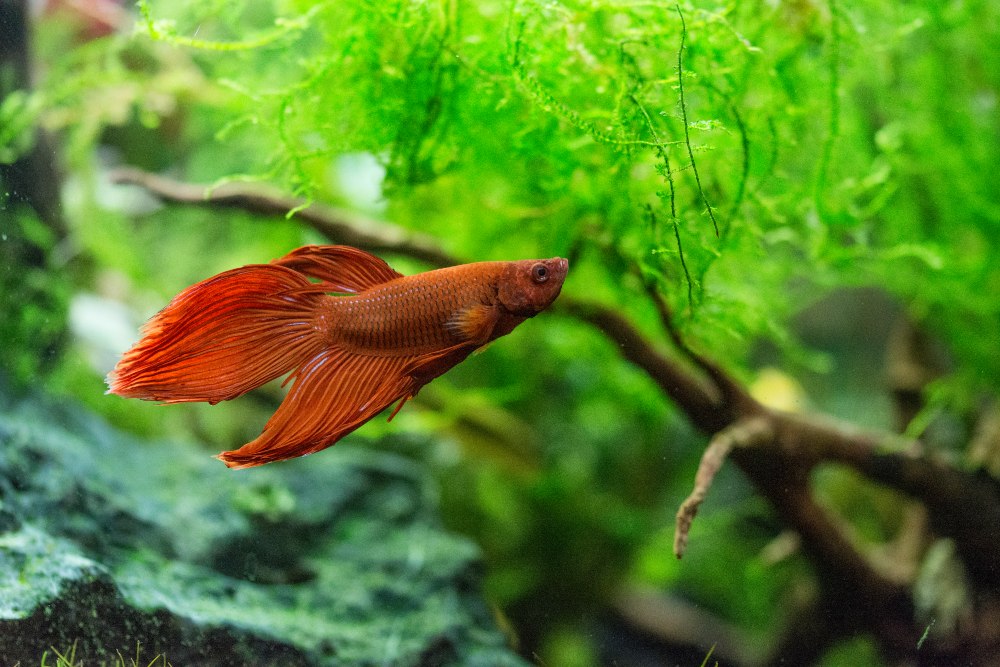
Factors Affecting Betta Vision
The darkness of night is an enigma that has baffled humans for centuries, and the same can be said for our finned friends. For betta fish, navigating their murky home in complete blackness seems like a daunting task – but do they have the ability to see in this unfamiliar environment?
Some studies suggest that bettas may indeed possess some vision in low light conditions. It appears that bettas are able to pick up on differences in color intensity even when there is limited lighting available, allowing them to distinguish shapes or movement within their habitat. This enables them to detect predators or potential food sources with remarkable accuracy.
Scientists believe that betta’s eyesight remains relatively consistent regardless of surrounding illumination levels due to specialized rods located throughout their retinas. These cells remain active under varying degrees of brightness, giving these little swimmers the capability to observe their surroundings without fear of the dark!
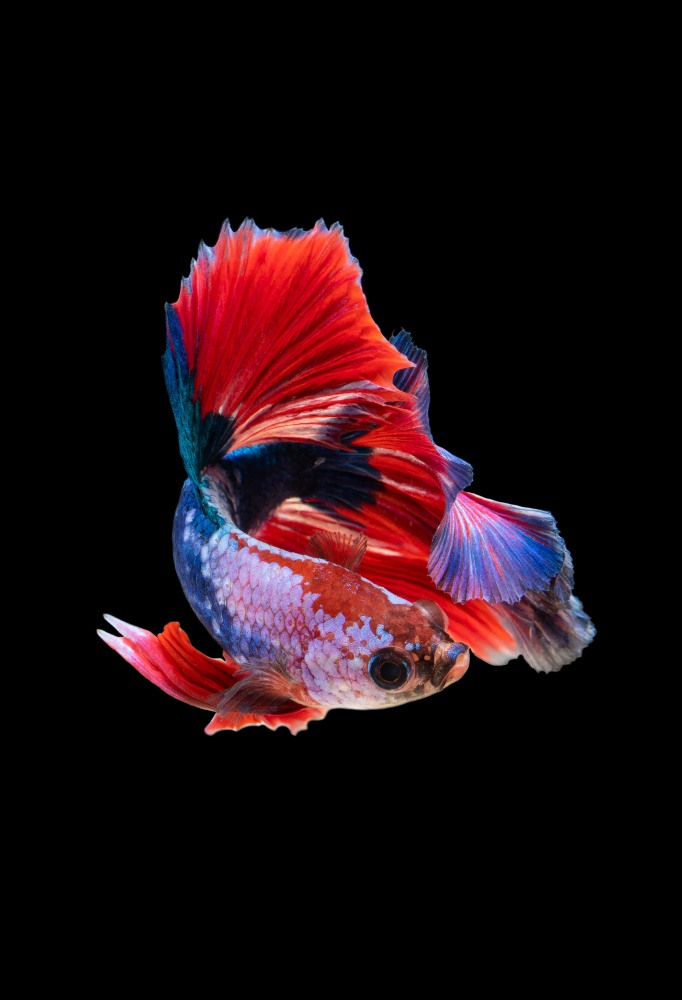
How To Create A Low-Light Environment For Betta Fish
Betta fish have remarkable vision, although there are certain factors that can affect it. The biggest one is the amount of light available for them to see in their environment. Many betta habitats lack lighting; this isn’t ideal when considering what a betta needs to be comfortable and healthy.
So how do you create a low-light environment for your bettas?
The first thing you should consider is providing some artificial lighting. This can range from simple LED or fluorescent lights to more complex ones such as full spectrum bulbs. If you’re looking to save on energy costs, try using simpler sources like LEDs instead of high wattage bulbs.
You may also want to install a timer so that the lights only come on during daylight hours and turn off at night. This will help maintain the natural day/night cycle which bettas require for proper rest and relaxation.
Another way to provide low-light conditions for your betta is by keeping the tank darker overall. To do this, add plants with large leaves that will block out most of the light from entering the tank. Additionally, use an opaque background or other dark material behind the aquarium, as well as thick curtains if possible.
Keeping these things in mind will go a long way toward creating a safe and secure home for your beloved fish friend!
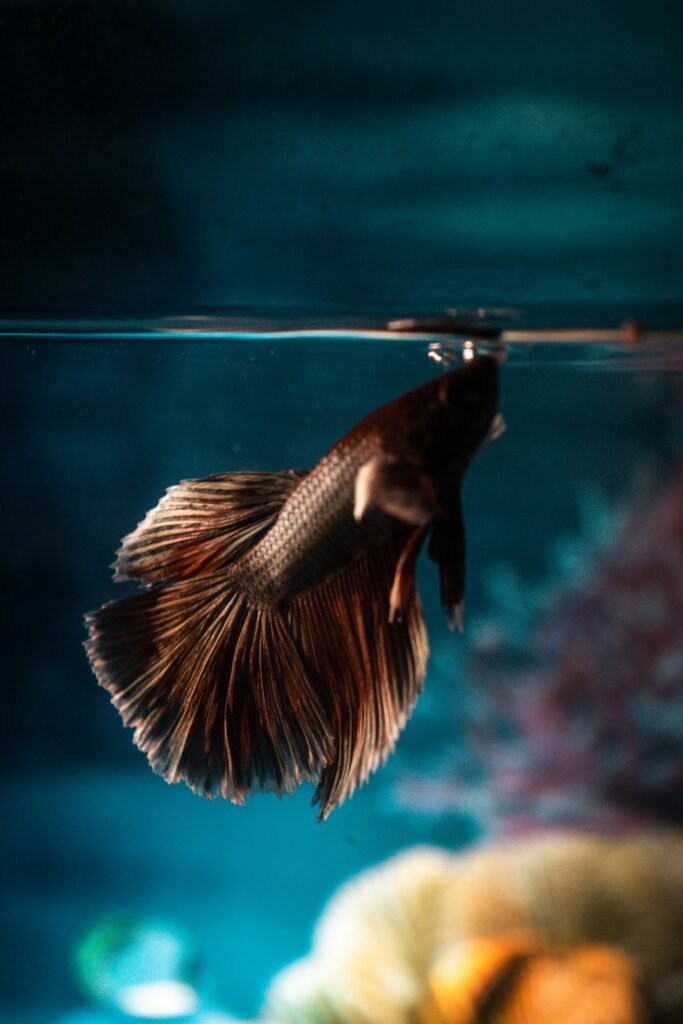
Conclusion
In conclusion, betta fish have unique vision capabilities compared to humans. Their eyes contain rods and cones that allow them to detect light in certain colors and navigate the darkness better than we can.
Additionally, their pineal gland helps regulate their sensitivity to light. Research has shown that when exposed to a low-light environment, betta fish can accurately remember shapes for up to 24 hours! This suggests they are able to both retain information much longer than previously thought, as well as adapt quickly to new environments.
All of these qualities make betta fish fascinating creatures worthy of our attention.
